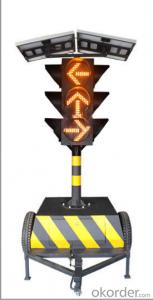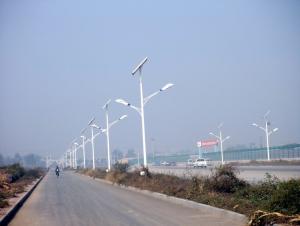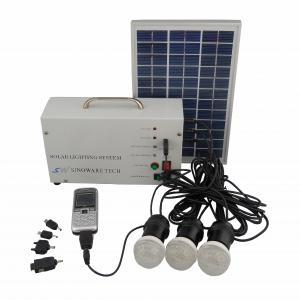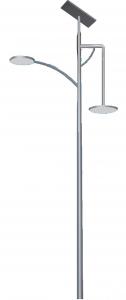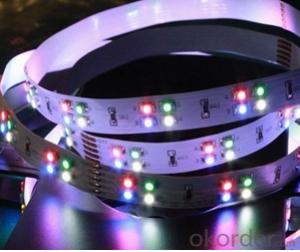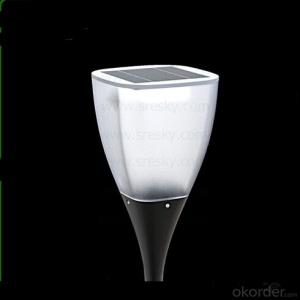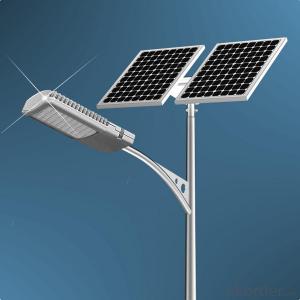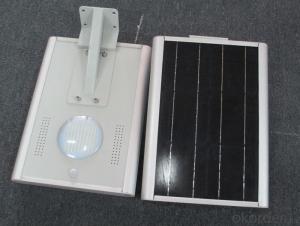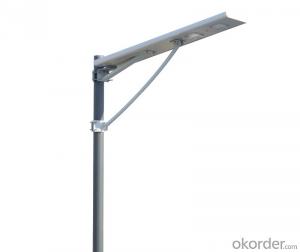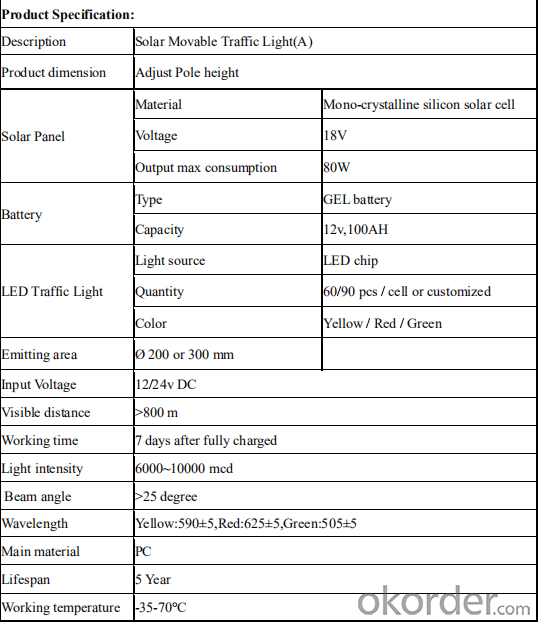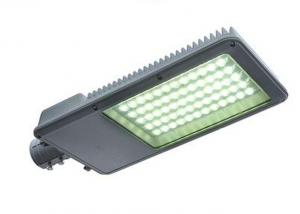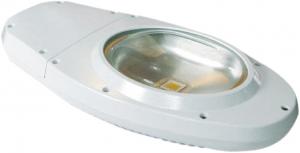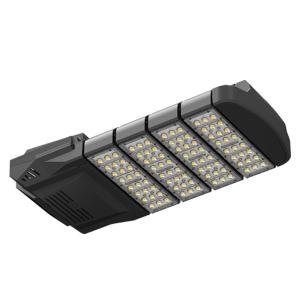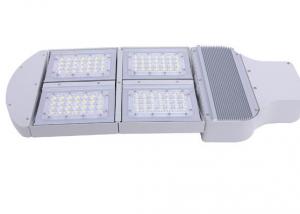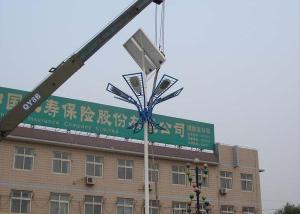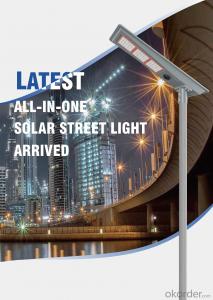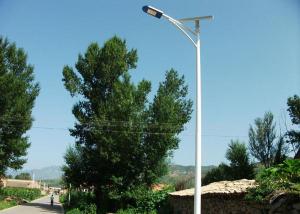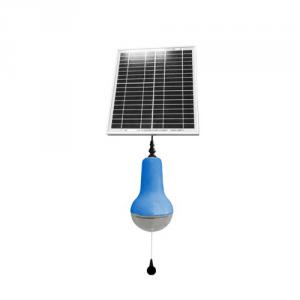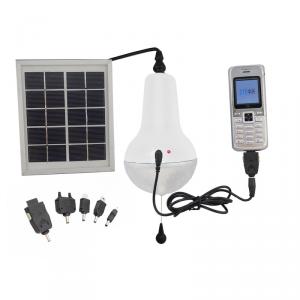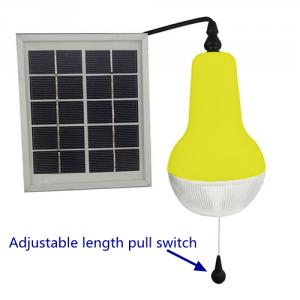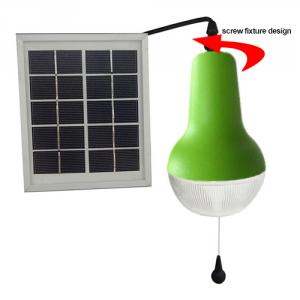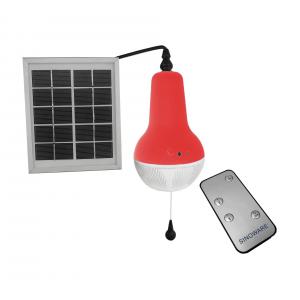200mm&300mm solar movable LED traffic signal light
- Loading Port:
- Shanghai
- Payment Terms:
- TT OR LC
- Min Order Qty:
- 1 set
- Supply Capability:
- 1000 set/month
OKorder Service Pledge
OKorder Financial Service
You Might Also Like
Our Advantages
1.The biggest manufacture of solar traffic safety products in China
2.Strong R&D department and experienced engineers that design and make OEM&ODM
products as the customers’ request or samples
3.Strict quality control is implemented in all aspects of operations to meet the high standards
of top-tier customer
4.All our products have gone through ISO certification
5.Our products are sold to domestic and abroad
6. Light source adopts imported chip four-element super brightness LED, LED branch current is no more than 15 mA while viewing angles are more than 30 degrees. The LED brand, model number, place of origin and technical parameters must be indicated in the tender documents.
7. Signal light controller can automatically reduce the brightness function at night.
8. Signal controller should have at least 32 outputs, with over 10 working menus that can be set. Methods of manual operation and the feature settings should be printed in striking place.
Packing and Transport:
Packing: Carton ;
Port:shanghai port;
.
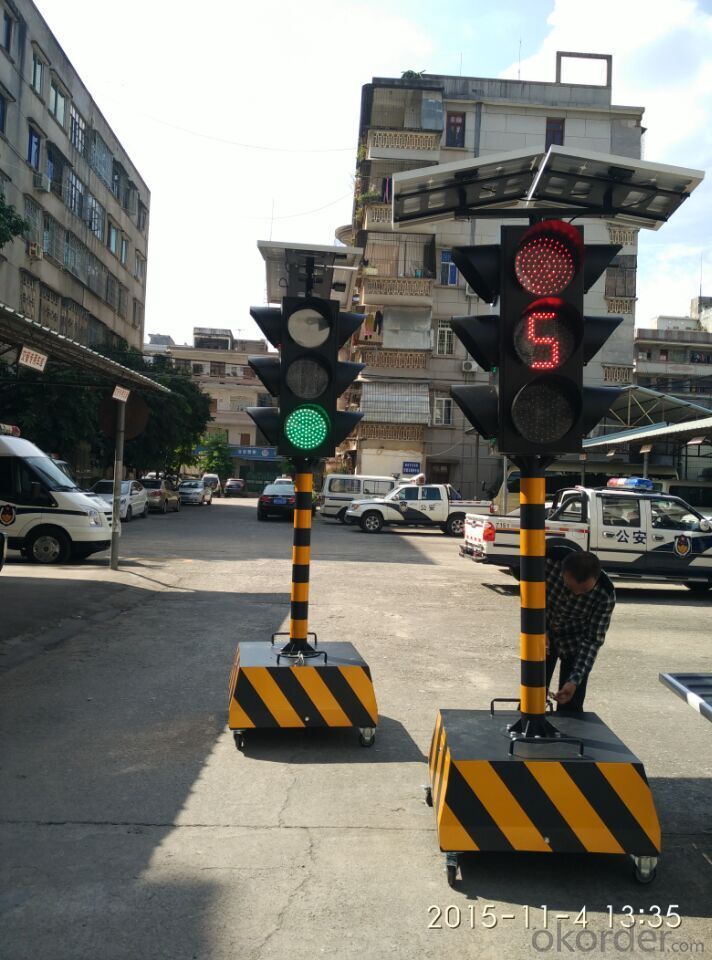
- Q:Are solar lights better than traditional lights?
- Yes, solar lights are generally considered better than traditional lights for several reasons. Firstly, solar lights are powered by clean and renewable energy from the sun, making them environmentally friendly and reducing dependence on electricity. Secondly, solar lights are easy to install, requiring no wiring or electrical connections, which makes them more versatile and cost-effective. Additionally, solar lights are energy-efficient and can save on electricity bills in the long run. Lastly, solar lights are typically low-maintenance and have longer lifespans, making them a reliable and hassle-free lighting option.
- Q:Do solar lights have a built-in power backup system?
- No, solar lights do not typically have a built-in power backup system. They rely solely on the energy stored in their rechargeable batteries, which is replenished through sunlight during the day.
- Q:Can solar lights be used for hiking trails or camping grounds?
- Yes, solar lights can definitely be used for hiking trails or camping grounds. In fact, they are a great alternative to traditional lighting options in outdoor settings. Solar lights are powered by sunlight, which means they don't require any electricity or batteries to operate. This makes them highly convenient and cost-effective for hiking or camping trips, where access to power sources may be limited. Solar lights are designed to be portable and lightweight, making them easy to carry and install along hiking trails or in camping grounds. They can be placed strategically to illuminate paths, campsites, or common areas, ensuring safety and visibility during nighttime activities. Solar lights also have the advantage of being environmentally friendly. They harness the sun's energy to generate power, reducing the reliance on non-renewable energy sources. This aligns with the principles of hiking and camping, which emphasize the preservation and conservation of nature. Furthermore, solar lights often come with different modes and settings, such as motion sensors or adjustable brightness levels. These features allow users to customize their lighting needs based on specific requirements and preferences. Overall, solar lights are a practical, sustainable, and reliable lighting solution for hiking trails and camping grounds. They provide the necessary illumination for outdoor activities while minimizing the environmental impact and ensuring convenience for users.
- Q:Can solar lights be used in urban areas with limited sunlight?
- Yes, solar lights can be used in urban areas with limited sunlight. While the efficiency of solar lights may be affected by reduced sunlight, advancements in solar technology have made it possible to capture and store energy even in low light conditions. Additionally, modern solar lights often come with efficient batteries that can provide backup power during periods of limited sunlight, ensuring continuous illumination.
- Q:Can solar lights be used in remote areas?
- Certainly, solar lights are a viable option for use in remote areas. In fact, they are particularly well-suited for such regions where access to electricity is limited or non-existent. Solar lights function by harnessing the sun's energy to charge their batteries during the day, enabling them to emit light at night. This adaptability makes them an excellent choice for areas that lack connections to the electrical grid. One of the primary advantages of utilizing solar lights in remote areas is their independence from conventional power sources. Consequently, individuals residing in these regions can enjoy lighting without the need for costly infrastructure or ongoing electricity expenses. Additionally, solar lights are straightforward to install and require minimal upkeep, making them a practical and cost-effective solution for remote areas. Furthermore, solar lights can greatly enhance safety and security in remote areas. They can be employed to illuminate streets, pathways, and public spaces, thereby facilitating safer nighttime navigation. Furthermore, solar lights can be utilized in homes, schools, and health clinics in remote areas, ensuring that basic lighting needs are met and enhancing the overall quality of life for residents. Moreover, solar lights are environmentally friendly, emitting no harmful emissions and relying solely on renewable energy sources. By utilizing the abundant sunlight available in remote areas, they contribute to reducing carbon footprints and preserving the natural environment. In summary, solar lights are a pragmatic, cost-effective, and sustainable solution for lighting in remote areas. They provide access to lighting in regions where traditional electricity is unavailable and contribute to improved safety, security, and quality of life for individuals residing in these areas.
- Q:Do solar lights have a built-in sensor for detecting darkness?
- Yes, solar lights typically have a built-in sensor called a photovoltaic cell or a light sensor that detects darkness and automatically turns on the light when it gets dark.
- Q:Are solar lights suitable for pathways or driveways?
- Yes, solar lights are suitable for pathways or driveways. They are a cost-effective and eco-friendly option for illuminating outdoor spaces. Solar lights are easy to install, require no wiring, and rely on sunlight to recharge their batteries, making them ideal for providing pathway or driveway lighting.
- Q:How do solar lights handle saltwater environments?
- Solar lights are generally well-suited for saltwater environments due to their durable construction and corrosion-resistant materials. The components of solar lights, such as the solar panels and housing, are designed to withstand exposure to saltwater, ensuring their longevity and functionality in such environments. However, it is always advisable to check the specifications of the specific solar light model to ensure its compatibility with saltwater conditions.
- Q:How do you calculate the number of solar lights needed for a specific area?
- To calculate the number of solar lights needed for a specific area, you would need to consider factors such as the area's size, the desired level of illumination, the type of solar lights being used, and the solar panel's capacity. By determining the lighting requirements, dividing the area into zones, and considering the solar lights' specifications, an accurate calculation can be made to determine the number of solar lights needed for the specific area.
- Q:How do I choose the right solar lights for my needs?
- When choosing the right solar lights for your needs, there are a few key factors to consider. Firstly, determine the purpose of the lights—whether they are for decorative purposes or to provide illumination for security or outdoor activities. Next, consider the location where the lights will be installed and the amount of sunlight it receives, as this will determine the solar panel's effectiveness. Look for lights with adjustable settings to customize brightness levels and lighting duration according to your preferences. Additionally, consider the durability and weather resistance of the lights, especially if they will be exposed to harsh outdoor conditions. Lastly, read customer reviews and compare prices to ensure you are getting a quality product within your budget.
1. Manufacturer Overview |
|
|---|---|
| Location | |
| Year Established | |
| Annual Output Value | |
| Main Markets | |
| Company Certifications | |
2. Manufacturer Certificates |
|
|---|---|
| a) Certification Name | |
| Range | |
| Reference | |
| Validity Period | |
3. Manufacturer Capability |
|
|---|---|
| a)Trade Capacity | |
| Nearest Port | |
| Export Percentage | |
| No.of Employees in Trade Department | |
| Language Spoken: | |
| b)Factory Information | |
| Factory Size: | |
| No. of Production Lines | |
| Contract Manufacturing | |
| Product Price Range | |
Send your message to us
200mm&300mm solar movable LED traffic signal light
- Loading Port:
- Shanghai
- Payment Terms:
- TT OR LC
- Min Order Qty:
- 1 set
- Supply Capability:
- 1000 set/month
OKorder Service Pledge
OKorder Financial Service
Similar products
New products
Hot products
Hot Searches
Related keywords
